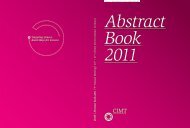Abstract Book 2010 - CIMT Annual Meeting
Abstract Book 2010 - CIMT Annual Meeting
Abstract Book 2010 - CIMT Annual Meeting
Create successful ePaper yourself
Turn your PDF publications into a flip-book with our unique Google optimized e-Paper software.
043 Liang | Cellular therapy<br />
Transfer of human T-cell receptor (TCR) containing murine<br />
chimeric constant betagamma-chain sequences reduces the risk<br />
of mixed heterodimers and enhanced the proliferation of<br />
transduced T cells<br />
Xiaoling Liang 1 , Yanyan Han 1 , Ingrid G. Schuster 2 , Luise U. Weigand 1 , Elfriede Eppinger 1 ,<br />
Dirk Busch 3 , Wolfgang Uckert 4 , Christian Peschel 1 , Angela Krackhardt 1<br />
1 Technical University Munich, Klinikum Rechts der Isar, Medizinische Klinik III,<br />
Innere Medizin mit Schwerpunkt Hämatologie und Onkologie, Munich, Germany<br />
2 Helmholtz Zentrum München-German Research Center for Environmental Health,<br />
Molecular Immunology, Munich, Germany<br />
3 Technical University Munich, Medical Microbiology, Immunology and Hygiene, Munich, Germany<br />
4 Max Delbrück Centrum, Berlin, Germany<br />
Adoptive transfer of tumor-associated antigen (TAA)<br />
or virus specific T-cell receptor (TCR)-transduced<br />
T cells may represent an attractive and promising<br />
approach to specifically treat malignant diseases<br />
and has been previously successfully applied in the<br />
clinic. However, there are different concerns which<br />
need to be addressed to further improve this therapeutic<br />
approach: First, the formation βγof heterodimers<br />
between endogenous and transduced TCR<br />
chains may abrogate specific TCR function and<br />
harbours a particular risk for unknown specificities.<br />
Second, longterm survival of TCR-transduced<br />
T cells has been demonstrated to be critical for the<br />
effectivity of this approach and needs to be further<br />
improved.<br />
We have previously identified several HLA-A2-allorestricted<br />
T-cell receptors with specificity for the<br />
breast cancer associated antigen HER2/neu and<br />
the hematopoietic lineage specific protein Forminlike<br />
protein 1 (FMNL1) which is overexpressed in<br />
diverse malignant cell lines and native leukemia<br />
cells. The FMNL1-specific TCR SK22 represents a<br />
weak TCR with low interchain affinity which was<br />
significantly improved by current optimization stra-<br />
tegies including murinization of constant chains<br />
and codon-optimization. We additionally modified<br />
this TCR as well as two other TCR with alternative<br />
specificities as HER2/neu and GP100 by introducing<br />
murinized constant chain betagamma (βγ)<br />
chimera, which results in reduced pairing of heterodimers<br />
in PBMC. More significantly, proliferation<br />
of T cells was clearly enhanced in effector cells and<br />
T cell clones transduced with αβγ compared to αβ<br />
TCR. Preliminary results suggest that also different<br />
cytokine patterns might be expressed. In contrast<br />
to a previous publication, we observed a significant<br />
polarization of CARMA-1 to the immunogical<br />
synapse in different TCR containing the chimeric<br />
chain combination and no decrease in Fas-Ligand<br />
expression in transduced T cells suggesting that<br />
altered CARMA-1 signaling might not be the only<br />
explanation for enhanced proliferation of T cells<br />
transduced or transgenic for the βγ-TCR.<br />
In conclusion, our data show that the transfer of<br />
TCR chain genes containing optimized murinized<br />
chimeric βγ-constant chains may have advantages<br />
and might be an alternative or synergistic choice<br />
for TCR optimization for adoptive T cell transfer.<br />
87



